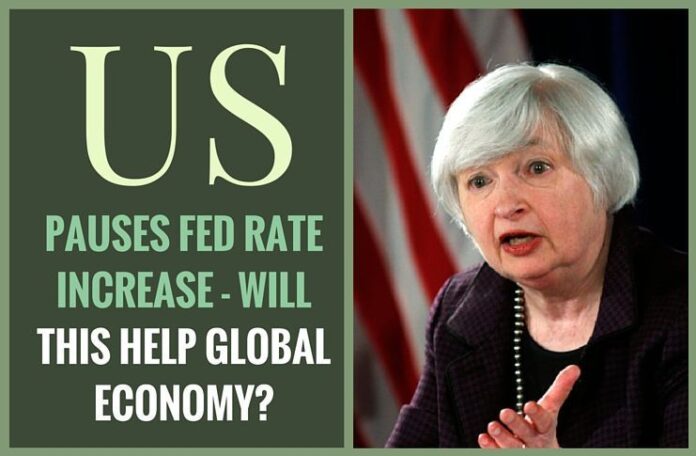
US Federal Reserve keeps interest rate increase unchanged
[dropcap color=”#008040″ boxed=”yes” boxed_radius=”8px” class=”” id=””]T[/dropcap]he pace of future interest rate hikes this year would be slow by the central bank which was signaled among the potential risks to the US economy, The US Federal Reserve kept its benchmark short-term interest rates unchanged.
“In the recent months, despite global economic and financial developments, the economic activity has been expanding at a moderate pace”. Which was said by the Fed to US, after a two-day policy meeting the statement was released on Wednesday.
“Marking the end of an era of extraordinary easing monetary policy, the first rate hike in almost a decade when the Fed raised its target range for the federal funds rate by 25 basis points to 0.25-0.5 percent, in December.
Raised increasing concerns about the strength of the US economy has forced Fed policymakers to hold off on any further rate hikes since the start of the year, when the turmoil in financial markets and a slowdown in global economy.
On the world’s largest economy, the impact of global economic and financial turbulence gives an indication of the uncertainty and about the balance of risks to the US economy the Fed declined to make a judgement, in its January policy statement.
[dropcap color=”#008040″ boxed=”yes” boxed_radius=”8px” class=”” id=””]T[/dropcap]he changes in the statement on risks signaled that Fed officials are inclined to wait for more time to assess the US economic outlook before raising interest rates again.
“We should not take the strength in the US labor market and consumption for granted,” Fed governor Lael Brainard said in a speech earlier this month. “From a risk-management perspective, this argues for patience as the outlook becomes clearer.”
The Fed’s updated projections released on Wednesday showed that policymakers expected the federal funds rate to rise to around 0.9 percent at the end of 2016, implying two quarter-percentage-point rate increases this year, down from four estimated in December.
“Most participants do continue to envision that if economic developments unfold as they expect that further increases in the federal funds rate will prove appropriate over time,” Fed Chair Janet Yellen said on Wednesday at a press conference after the policy meeting, indicating the central bank is still on track to raise interest rates later this year.
“As the US economy approaches full employment, wage pressures are expected to start rising and pushing up inflation towards the central bank’s 2 percent target, according to Fed officials. This gives the central bank reasons to consider raising interest rates to prevent the economy from overheating.
The US unemployment rate held steady at 4.9 percent in February, near the level many Fed officials believe represents full employment.
The economy added 242,000 new jobs last month, more than twice the minimum amount of monthly job growth needed to stabilize the unemployment rate, according to the Labor Department.
The so-called core PCE (personal consumption expenditures) price index, a Fed’s preferred measure of core inflation excluding food and energy, increased 1.7 percent in January from a year ago, the biggest year-on-year gain since the end of 2012.
[dropcap color=”#008040″ boxed=”yes” boxed_radius=”8px” class=”” id=””]S[/dropcap]tanley Fischer, vice chairman of the Fed, said earlier this month that the US may be seeing “the first stirrings of an increase in the inflation rate”, suggesting he may be willing to raise interest rates in coming months.
“They need to find employment growth to start slowing down, because if it doesn’t start slowing down, they’re going to be behind the curve,” Joseph Gagnon, a former Fed economist and a senior fellow at the Peterson Institute for International Economics, told Xinhua.
“That (the employment growth) has been strong. That’s why they have to raise interest rates,” Gagnon said, predicting that the central bank could hike interest rates as soon as its next policy meeting in April.
But about 76 percent of the business and academic economists polled by the Wall Street Journal this month estimated that the Fed would wait until June to raise interest rates.
“The central bank’s baseline expectations for US economic activity, the labor market and inflation “have not changed much since December,” Yellen said, adding that “economic conditions will evolve in a manner that will warrant only gradual increases in the federal funds rate.”
About Federal rate increase
Here is an informative post.
Notes:
1. IANS
- Pentagon cancels aid to Pakistan over record on militants - September 2, 2018
- The curious case of Tamil Nadu’s opposition to NEET - September 4, 2017
- If 2.6 Billion People Go To War: India vs. China - July 22, 2017








